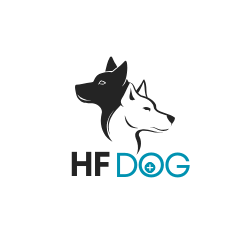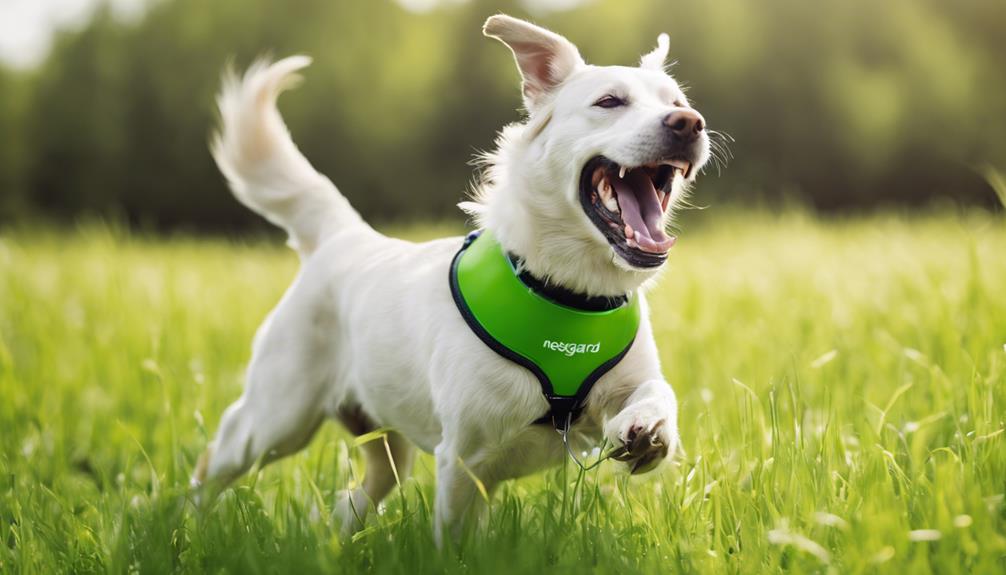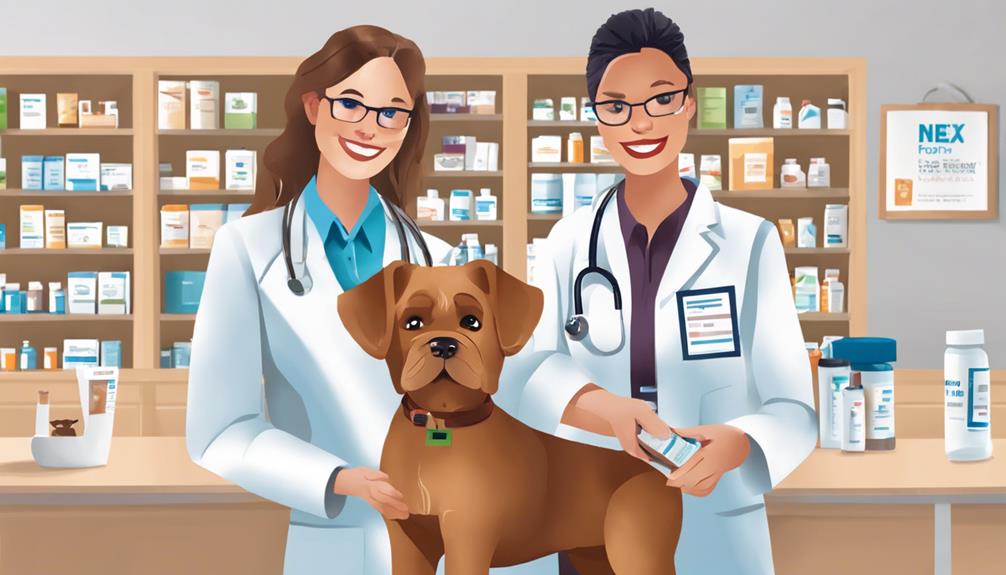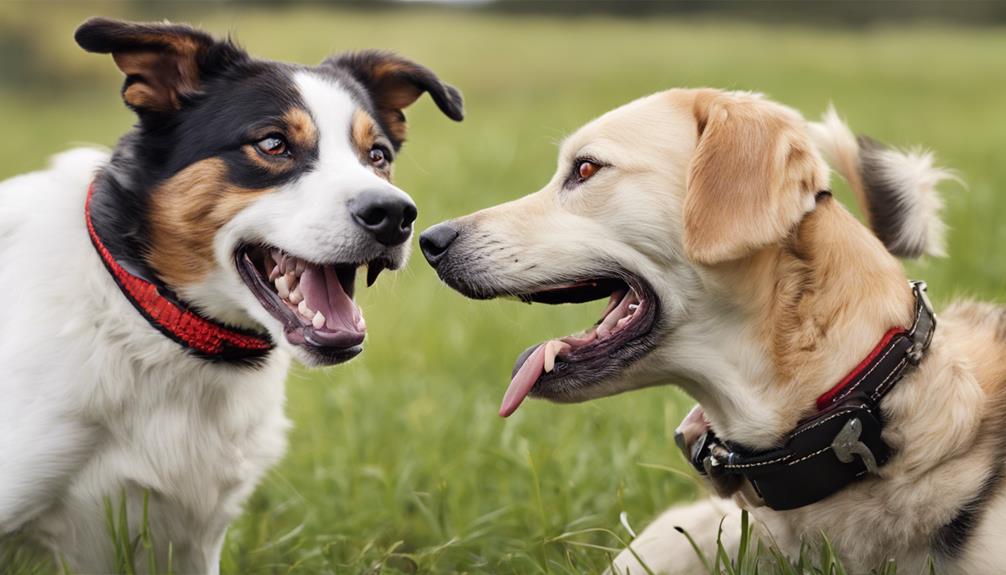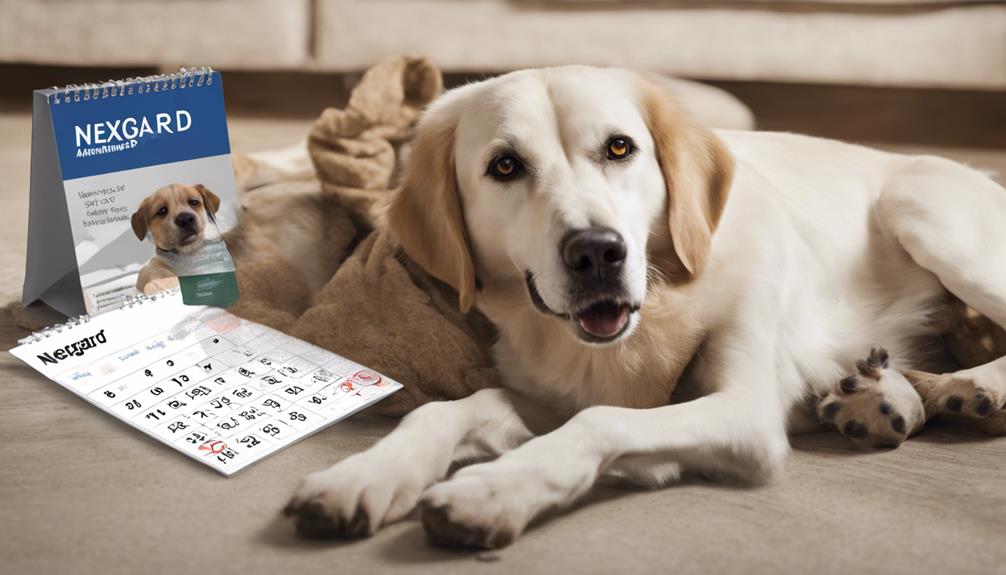Is Nexgard Safe for Dogs
Nexgard is generally safe for dogs. It’s an oral medication that kills fleas and ticks by affecting their nervous systems. It’s easy to give like a treat and doesn’t need drying time. Though it can cause mild to severe side effects, like vomiting or seizures, it’s well-tolerated in most cases. Always watch out for any unusual symptoms and ask your vet for advice. Keep in mind safety concerns and monitor your furry friend closely after giving it. Want to know more about Nexgard for your pet’s well-being?
Key Takeaways
- Nexgard is well-tolerated with low side effects.
- Consult a vet for any unusual symptoms.
- Monitor for vomiting, diarrhea, or lethargy.
- Allergic reactions to afoxolaner are possible.
- Adhere to proper dosage and storage guidelines.
What Is Nexgard for Dogs?
When considering Nexgard for dogs, it’s essential to understand its purpose and how it functions to protect against fleas and ticks. Nexgard is an oral flea and tick medication designed to provide a convenient and effective way to safeguard your furry friend against these common parasites.
The active ingredient in Nexgard, afoxolaner, works by targeting the nervous system of fleas and ticks, ultimately leading to their death.
Administering Nexgard is simple. You can give it to your dog like a treat, and most dogs find the flavored chewable tablets palatable. Once ingested, Nexgard travels through your dog’s bloodstream, and when fleas or ticks bite your pet, they ingest the medication. This ingestion disrupts the parasites’ nerve cells, effectively killing them.
Unlike topical treatments, Nexgard doesn’t require any drying time, so you can cuddle with your dog immediately after administration.
Understanding Nexgard Safety Concerns
If considering the safety of Nexgard for dogs, it’s essential to be aware of potential concerns and risks associated with this oral flea and tick medication. While Nexgard is generally considered safe and effective for most dogs, there are certain safety concerns that dog owners should keep in mind. One primary concern is the possibility of side effects, which can vary from mild to severe reactions. It’s important to monitor your dog after administering Nexgard and consult your veterinarian if you notice any unusual symptoms or behaviors.
Additionally, some dogs may be sensitive or allergic to the active ingredient in Nexgard, afoxolaner. Allergic reactions can manifest as itching, hives, swelling, or even more severe symptoms like difficulty breathing. It’s crucial to observe your dog closely, especially after the first few doses, to ensure they aren’t experiencing any adverse reactions.
Understanding these safety concerns and being vigilant about monitoring your dog can help ensure a safe experience when using Nexgard for flea and tick prevention. Remember, always consult with your veterinarian if you have any concerns about your dog’s health or the medication’s safety.
Potential Side Effects of Nexgard
To better understand the safety of Nexgard for your dog, it’s important to be aware of the potential side effects that may arise from using this oral flea and tick medication. While Nexgard is generally well-tolerated, some dogs may experience side effects. The most commonly reported side effects include vomiting, diarrhea, lethargy, and lack of appetite. In rare cases, more severe reactions such as seizures, tremors, and neurological signs have been reported. It’s crucial to monitor your dog after administering Nexgard and contact your veterinarian if you notice any concerning symptoms.
Additionally, some dogs may be sensitive or allergic to the active ingredient in Nexgard, afoxolaner. Allergic reactions can manifest as itching, hives, swelling, or difficulty breathing. If your dog shows any signs of an allergic reaction, seek immediate veterinary care. Remember that every dog is different, and while many dogs tolerate Nexgard well, it’s essential to be vigilant for any signs of adverse reactions to ensure the safety and well-being of your furry companion.
Studies and Research on Nexgard Safety
Research findings consistently support the safety of Nexgard for dogs when used according to the recommended guidelines. Various studies have been conducted to evaluate the safety profile of Nexgard, with the majority concluding that it’s a well-tolerated and effective treatment for controlling fleas and ticks in dogs. These studies have assessed a range of factors, including adverse reactions, efficacy in parasite control, and overall safety in different breeds and sizes of dogs.
One study published in a veterinary journal examined the safety of Nexgard by monitoring adverse events reported by veterinarians and pet owners. The results showed that the incidence of side effects was low and generally mild, with most dogs tolerating the medication well. Another research project focused on the efficacy of Nexgard in preventing flea and tick infestations, highlighting its effectiveness in protecting dogs from these parasites.
Tips for Safely Using Nexgard
When using Nexgard for your dog, ensure you follow these key tips to ensure their safety and effectiveness.
First, always administer Nexgard according to the dosage instructions provided by your veterinarian. Giving the correct dosage based on your dog’s weight is crucial for the medication to work properly and prevent any potential side effects. Additionally, it’s essential to monitor your dog after giving them Nexgard to ensure they don’t experience any adverse reactions. Keep an eye out for symptoms like vomiting, lethargy, or loss of appetite, and contact your vet immediately if you notice anything concerning.
Another important tip is to never give Nexgard to puppies under 8 weeks of age. It’s designed for use in adult dogs, so using it on young puppies can be harmful. Furthermore, always store Nexgard in a cool, dry place away from direct sunlight to maintain its effectiveness. By following these tips, you can safely use Nexgard to protect your dog from fleas and ticks.
Frequently Asked Questions
Can Nexgard Be Safely Used in Pregnant or Nursing Dogs?
During pregnancy or nursing, it’s crucial to consult your vet before using Nexgard on your dog. Safety concerns for pregnant or nursing dogs require professional guidance to ensure the well-being of both mother and puppies.
Are There Any Known Interactions Between Nexgard and Other Medications or Supplements?
When considering interactions between Nexgard and other medications or supplements, always consult a veterinarian. They can provide guidance on any potential risks or complications. It’s crucial to prioritize your dog’s health and well-being.
Can Nexgard Be Used Safely in Dogs With Preexisting Health Conditions?
You should consult your vet before giving Nexgard to dogs with preexisting health conditions. They can provide guidance tailored to your pet’s specific situation, ensuring their safety and well-being while using this medication.
Are There Any Long-Term Safety Concerns Associated With Using Nexgard Regularly?
Long-term safety concerns with regular Nexgard use are minimal when following the recommended guidelines. Consult your vet for personalized advice. Keep an eye out for any unusual reactions in your dog and report them promptly.
Is Nexgard Safe for Use in Puppies and Senior Dogs?
In puppies and senior dogs, Nexgard is generally considered safe when used as directed. However, always consult your vet before starting any new medication or if you have concerns about potential side effects.
Conclusion
Overall, Nexgard is generally safe for dogs when used as directed.
While there may be some potential side effects to be aware of, the benefits of protecting your dog from fleas and ticks often outweigh the risks.
It’s important to consult with your veterinarian before starting any new medication for your pet and to closely monitor for any adverse reactions.
By following proper safety guidelines, you can help ensure that Nexgard is a safe and effective option for your furry friend.
